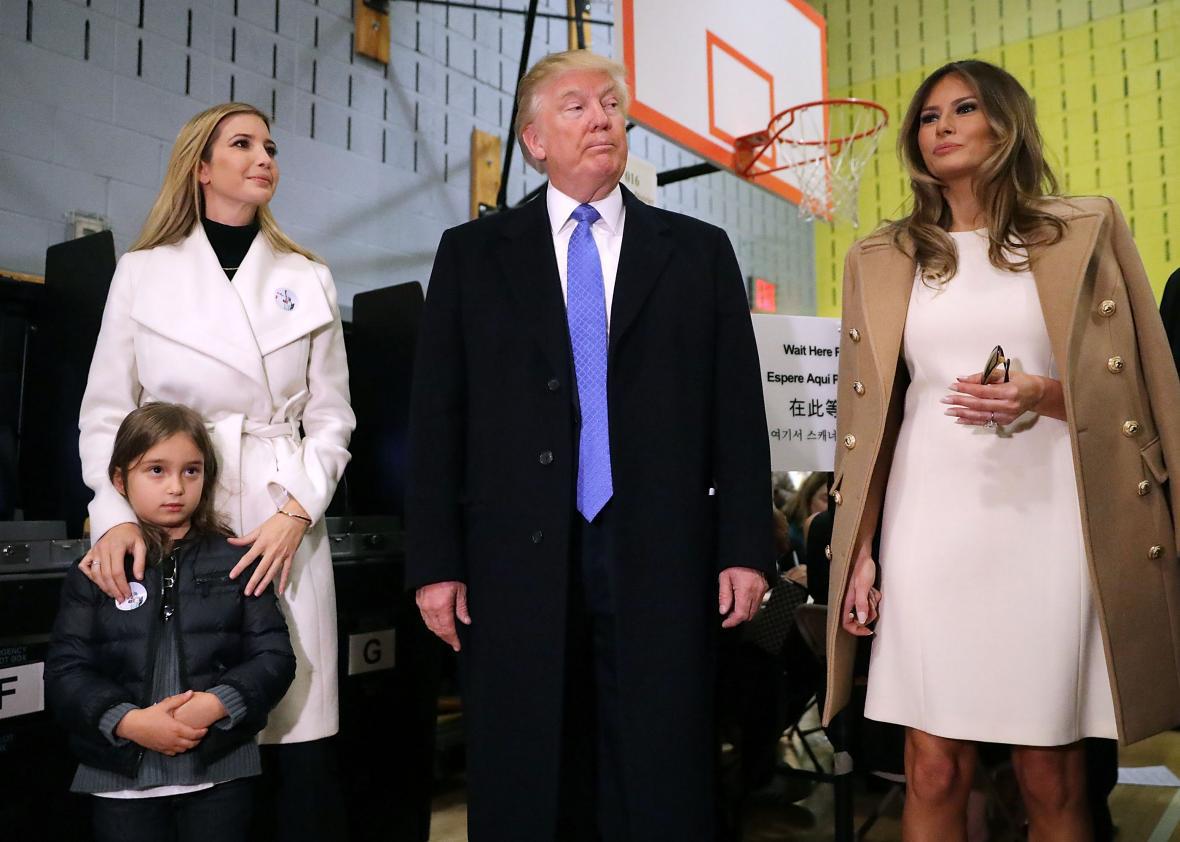Ivanka’s #WomenWhoWork lifestyle brand is designed to help women whose biggest burden is to navigate abundance. Her website publishes profiles of women who share advice on things like running a business on one’s own terms and tips on how to look “impossibly stylish” while mixing work and family. Oh, and, whaddya know, Ivanka just so happens to offer a clothing line that she created to help all the busy working women to do just that.
Absent on IvankaTrump.com are women with whom Ivanka is, presumably, incredibly intimate, but whose lives can not be improved by a modest-yet-feminine, $138 sheath.
These include the nannies, housekeepers, and other members of the Kushner-Trump household staff who keep the floors shiny, linens clean, children busy, and refrigerator stocked. Relying on this kind of help doesn’t make Ivanka and Jared uninvolved, or negligent, parents; they’re just an especially busy dual-career couple who can’t possibly manage all the professional, personal, and domestic demands on their own. Ivanka might think that keeping her domestic employees out of the frame makes her appear like a superwoman who can do it all. But in reality, it just sends the message that she doesn’t entirely value their contributions to her life.
Writing in New York magazine, Amy Larocca has issued a call for Ivanka to “show us the women who work to make her life possible.”
“Why are the other women who make this idea of “work” possible, who are so integral to the equation, kept invisible? Is it because once a member of #teamIvanka is done strolling a few blocks with a toddler in blue-velvet stiletto heels, someone in less photogenic shoes is required to finish the job?,” Larocca writes. Or, is it because domestic and care work “is not best performed in slim-fitting, one-shouldered sheaths? Because they have little use for knockoff versions of designer shoes, therefore they are ‘off-brand’ for #teamIvanka?”
Larocca ends her post by inviting readers to share pictures of all the women whose work remains unacknowledged by Ivanka, even as they make her life possible.
This paradigm is unsettling, though not surprising considering that a denial of the caretaking struggles of all who are are not sheathed women defines Ivanka’s politics, too. The maternity leave policy that Donald Trump proposed at Ivanka’s behest—“Daddy, daddy, we have to do this,”—would provide six weeks of paid unemployment benefits for birth mothers only. Besides being politically and economically unviable, the plan excludes fathers, adoptive parents, same-sex parents, as well as anyone who needs to take time off to care for a sick child or relative. By doing so, it perpetuates the idea that care work is women’s work, which can hurt women at work in the long-run. The more a family depends on mom’s paycheck—and the majority of families who rely on mom’s paycheck struggle financially—the more economic toll this policy is likely to take.
Trump’s Ivanka-endorsed child care policy is not much better. It would allow parents or guardians to deduct the average cost of child care in their state from their income taxes. On his website, we learn that: “A family making the national average of about $70,000 each year with a $7,000 child-care burden, for example, would annually save $840. Parents who earn more than $250,000 individually or $500,000 together would not qualify for Trump’s break.” This doesn’t sound like a great source of relief for middle-class families, especially compared to Hillary Clinton’s promise to cap child care expenses at 10 percent of a family’s income. Also, it would fail to benefit low-income Americans, which includes many child care workers, who need relief the most. The poorest families pay little to no income taxes, and therefore wouldn’t benefit from a rebate. Trump has proposed additional rebates for these families, but they’d only likely amount to a minor boost, coming in around $150 a year. In short, Ivanka and Jared wouldn’t benefit from this plan, but neither would most of the people hired to cook, clean, and do child care for families like theirs.
The absence of family-friendly policies in the United States isn’t just the result of a legislative failure, but also a widespread inability to acknowledge and value the social and economic value of care work. Ivanka, in both her professional and political work, has yet to do that, and I suspect the fate of her father’s policies won’t be wildly different.
